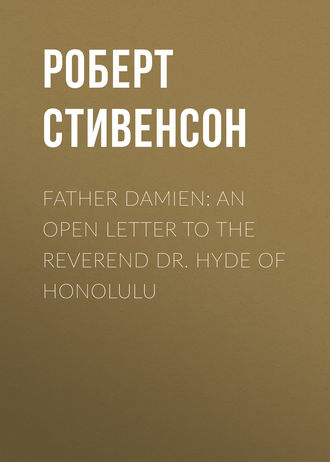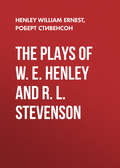
Роберт Льюис Стивенсон
Father Damien: An Open Letter to the Reverend Dr. Hyde of Honolulu
Your sect (and remember, as far as any sect avows me, it is mine) has not done ill in a worldly sense in the Hawaiian Kingdom. When calamity befell their innocent parishioners, when leprosy descended and took root in the Eight Islands, a quid pro quo was to be looked for. To that prosperous mission, and to you, as one of its adornments, God had sent at last an opportunity. I know I am touching here upon a nerve acutely sensitive. I know that others of your colleagues look back on the inertia of your Church, and the intrusive and decisive heroism of Damien, with something almost to be called remorse. I am sure it is so with yourself; I am persuaded your letter was inspired by a certain envy, not essentially ignoble, and the one human trait to be espied in that performance. You were thinking of the lost chance, the past day; of that which should have been conceived and was not; of the service due and not rendered. Time was, said the voice in your ear, in your pleasant room, as you sat raging and writing; and if the words written were base beyond parallel, the rage, I am happy to repeat – it is the only compliment I shall pay you – the rage was almost virtuous. But, sir, when we have failed, and another has succeeded; when we have stood by, and another has stepped in; when we sit and grow bulky in our charming mansions, and a plain, uncouth peasant steps into the battle, under the eyes of God, and succours the afflicted, and consoles the dying, and is himself afflicted in his turn, and dies upon the field of honour – the battle cannot be retrieved as your unhappy irritation has suggested. It is a lost battle, and lost for ever. One thing remained to you in your defeat – some rags of common honour; and these you have made haste to cast away.
Common honour; not the honour of having done anything right, but the honour of not having done aught conspicuously foul; the honour of the inert: that was what remained to you. We are not all expected to be Damiens; a man may conceive his duty more narrowly, he may love his comforts better; and none will cast a stone at him for that. But will a gentleman of your reverend profession allow me an example from the fields of gallantry? When two gentlemen compete for the favour of a lady, and the one succeeds and the other is rejected, and (as will sometimes happen) matter damaging to the successful rival’s credit reaches the ear of the defeated, it is held by plain men of no pretensions that his mouth is, in the circumstance, almost necessarily closed. Your Church and Damien’s were in Hawaii upon a rivalry to do well: to help, to edify, to set divine examples. You having (in one huge instance) failed, and Damien succeeded, I marvel it should not have occurred to you that you were doomed to silence; that when you had been outstripped in that high rivalry, and sat inglorious in the midst of your well-being, in your pleasant room – and Damien, crowned with glories and horrors, toiled and rotted in that pigsty of his under the cliffs of Kalawao – you, the elect who would not, were the last man on earth to collect and propagate gossip on the volunteer who would and did.
I think I see you – for I try to see you in the flesh as I write these sentences – I think I see you leap at the word pigsty, a hyperbolical expression at the best. “He had no hand in the reforms,” he was “a coarse, dirty man”; these were your own words; and you may think it possible that I am come to support you with fresh evidence. In a sense, it is even so. Damien has been too much depicted with a conventional halo and conventional features; so drawn by men who perhaps had not the eye to remark or the pen to express the individual; or who perhaps were only blinded and silenced by generous admiration, such as I partly envy for myself – such as you, if your soul were enlightened, would envy on your bended knees. It is the least defect of such a method of portraiture that it makes the path easy for the devil’s advocate, and leaves the misuse of the slanderer a considerable field of truth. For the truth that is suppressed by friends is the readiest weapon of the enemy. The world, in your despite, may perhaps owe you something, if your letter be the means of substituting once for all a credible likeness for a wax abstraction. For, if that world at all remember you, on the day when Damien of Molokai shall be named a Saint, it will be in virtue of one work: your letter to the Reverend H. B. Gage.
You may ask on what authority I speak. It was my inclement destiny to become acquainted, not with Damien, but with Dr. Hyde. When I visited the lazaretto, Damien was already in his resting grave. But such information as I have, I gathered on the spot in conversation with those who knew him well and long: some indeed who revered his memory; but others who had sparred and wrangled with him, who beheld him with no halo, who perhaps regarded him with small respect, and through whose unprepared and scarcely partial communications the plain, human features of the man shone on me convincingly. These gave me what knowledge I possess; and I learnt it in that scene where it could be most completely and sensitively understood – Kalawao, which you have never visited, about which you have never so much as endeavoured to inform yourself; for, brief as your letter is, you have found the means to stumble into that confession. “Less than one-half of the island,” you say, “is devoted to the lepers.” Molokai – “Molokai ahina,” the “grey,” lofty, and most desolate island – along all its northern side plunges a front of precipice into a sea of unusual profundity. This range of cliff is, from east to west, the true end and frontier of the island. Only in one spot there projects into the ocean a certain triangular and rugged down, grassy, stony, windy, and rising in the midst into a hill with a dead crater: the whole bearing to the cliff that overhangs it somewhat the same relation as a bracket to a wall. With this hint you will now be able to pick out the leper station on a map; you will be able to judge how much of Molokai is thus cut off between the surf and precipice, whether less than a half, or less than a quarter, or a fifth, or a tenth – or, say a twentieth; and the next time you burst into print you will be in a position to share with us the issue of your calculations.






